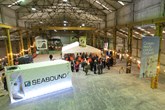Western Bulk reports net profit of US$2.5 million in the first half of 2024
Published by David Bizley,
Senior Editor
Dry Bulk,
For the first half of 2024, Western Bulk Chartering AS generated a net profit after tax of US$2.5 million from a Net TC of US$15.1 million and Net TC Margin per ship day of US$626. The number of vessels increased to an average of 133, up from 125 in the same period last year, driven by growth within the Panamax segment.
H1 2024 proved to be a strong first half for the dry bulk market. The Baltic Supramax Index 58’(BSI) averaged US$13 975/day in H1 2024, 17% higher than the US$11 974/day achieved in H2 2023 and 33% higher than H1 2023. The spread between Atlantic and Pacific markets averaged US$924/day, down from US$2151/day in the same period last year.
Entering the year, the company held a long position with more vessel than cargo commitments, and thus benefited from the strong market. To a large degree, the profit from this long position has been reinvested in repositioning of vessels (back haul) from the Pacific to a typically higher paying Atlantic market, and this is expected to yield substantial returns in the second half. The cost of repositioning vessels has been lower than historical levels due to higher paying steel exports out of China. As is typical with seasonal trends, we anticipate the Atlantic market to outperform the Pacific market in H2-24. The upcoming US grain export season, along with sustained healthy volumes from the South Atlantic, would be key factors driving such outperformance.
The Board of Directors has decided not to declare a dividend for Q2-24 as working capital headroom is needed for volume growth.
Click here for free registration to Dry Bulk
Read the article online at: https://www.drybulkmagazine.com/dry-bulk/22082024/western-bulk-reports-net-profit-of-us25-million-in-the-first-half-of-2024/
You might also like
Seabound receives ESA award and completes first full-scale carbon capture units
Seabound celebrates completion of first full-scale maritime carbon capture units and €1.5 million European Space Agency award at event in Doncaster.

